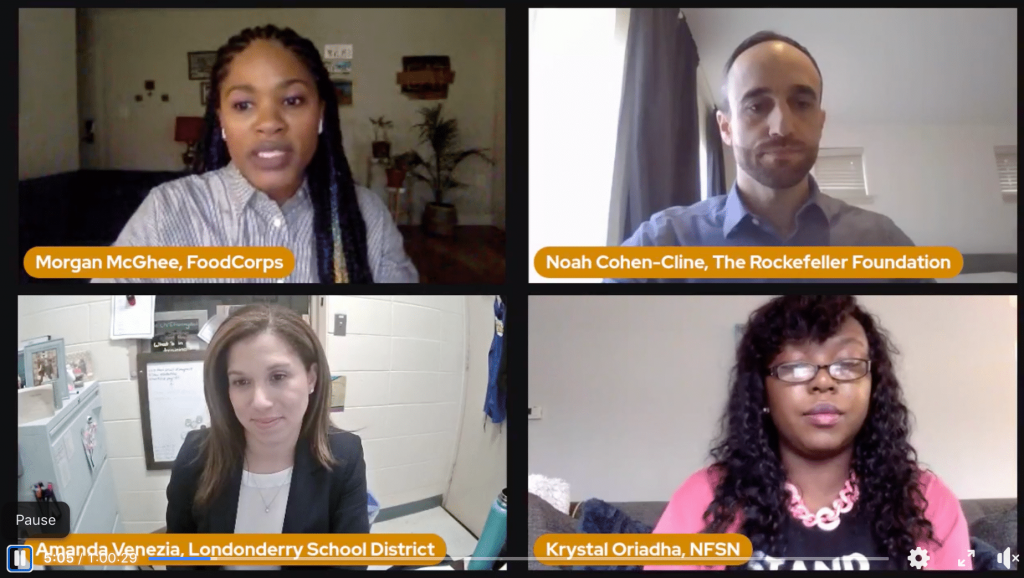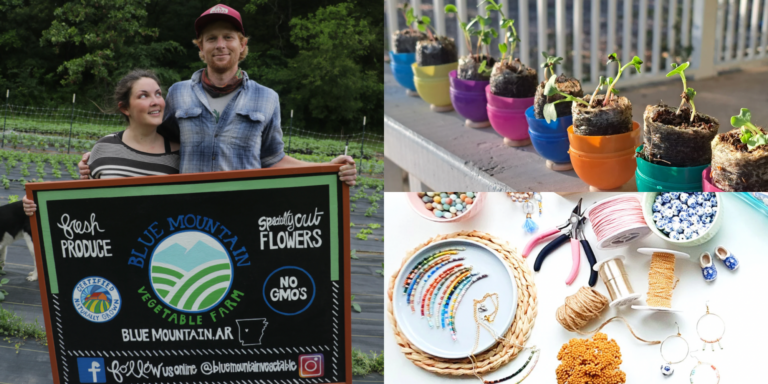Recap: Virtual Town Hall on A Shared Vision for School Food Policy
On January 26, more than 300 school food advocates gathered for FoodCorps’ first Virtual Town Hall of the new year.
On January 26, more than 300 school food advocates gathered for FoodCorps’ first Virtual Town Hall of the new year.

School food policy has the power to shape real, lasting change across the political sphere, impacting education, climate change, rural economies, and racial justice, to name a few.
On January 26, more than 300 school food advocates gathered for A Shared Vision for School Food Policy, FoodCorps’ first Virtual Town Hall of the new year, to discuss these crucial issues.
In this conversation, moderated by FoodCorps’ Director of School Nutrition Leadership, Morgan McGhee, the panelists discussed the opportunities for school food policy given our current realities: the dawn of a new presidential administration, one year into a global pandemic, and a heightened awareness of racial injustice and systemic inequities across the country.
“I got into school food with the belief that schools can be a catalyst for change. It’s unfortunate that it took a global pandemic for that realization to become widespread.” —Morgan McGhee
Panelists also made the case for universal free school meals, increased financial support for school nutrition professionals, and approaches to school food that center BIMPOC farmers, producers, and other food providers. School food, the panelists agreed, can be a catalyst for change in our schools and communities. “For kids to learn we need to make sure they are fed,” said Krystal Oriadha, Senior Director of Programs and Policy at the National Farm to School Network. “Access to food is a vital part of the conversation around equality.”
“The biggest opportunity over the next four years is to use school food to drive policy around the administration’s top four policy goals: pandemic, economic recovery, racial justice and climate change,” said Noah Cohen-Cline, Lead Program Officer, Food Initiative for The Rockefeller Foundation. “We need to ensure that all children have access to free, healthy school meals.”
In an audience Q&A, panelists also answered questions about bringing partners into efforts for school nutrition and gaining buy-in from stakeholders during difficult times.
“[School nutrition professionals] are exhausted. We are so tired,” said Amanda Venezia, Director of Dining Services for Londonderry School District. “We have been planning for scenarios A, B, C and D for almost a year. What we need more than anything right now is advocacy; we need a voice. Everyone has been applauding us and recognizing us as essential, and it’s time to take that good mojo and put it toward where it needs to be: universal school meals.”
Morgan McGhee, Director of School Nutrition Leadership, FoodCorps (moderator)
As a public health dietitian, Morgan has spent her career serving America’s youth in Texas, California, and Virginia as a menu planner, nutrition educator, and food services operations specialist. Morgan is a strong advocate for a nation where all children have access to sustainable healthy food that links the cafeteria to the classroom. She passionately believes that a school nutrition department can be a change agent in the community when innovative partnerships are coupled with dynamic leadership.
Krystal Oriadha, Senior Director of Programs and Policy, National Farm to School Network
Krystal Oriadha is the Senior Director of Policy and Programs for the National Farm to School Network. With over 10 years of experience as a community advocate around criminal justice reform, education, women’s rights, LGBTQ rights, and food justice. She is the co-founder of PG Change Makers and The LGBTQ Dignity Project. She also currently serves as Vice President of Make Smart School and the Maldon Foundation. Krystal was awarded the 40 under 40 award in 2019 for public services and Howard University’s MoveMaker award for outstanding alumni in 2019. She was also selected to serve on the 2019 Clinton Foundation’s 20|30 Leadership Council which serves as the foundation’s Junior Board. Krystal attended Howard University for her BBA in International Business and Amberton University for her MBA.
Noah Cohen-Cline, Lead Program Officer, Food Initiative, The Rockefeller Foundation
Noah joined The Rockefeller Foundation in 2018 to support the creation of a new global initiative to catalyze nourishing, equitable, and regenerative food systems. He currently leads the Foundation’s work on school food in the United States. Prior to joining the Foundation, Noah led a food systems portfolio for the Clinton Foundation, and has worked as a food security researcher and rural development and human rights grantmaker in India, Indonesia, and Central Asia.
Amanda Venezia, Director of Dining Services, Londonderry School District
A restaurant and hospitality professional since 2005, Amanda is currently in her 10th year rocking school lunches as a director in New Hampshire. A wife, mom and vlogger, Amanda has a passion for business operations—but don’t discount her proficiency and creativity in the kitchen. Amanda has won such awards as FoodService Director Magazine’s 2019 Rising Star and 2020 New Hampshire’s Top 40 Under Forty.
When we talk about universal meals, it can’t just be about putting food in the hands of schools. It’s also about building resilient communities and prioritizing BIPOC farmers and others who have been left out of the conversation. For this to work, all voices and stakeholders must be valued.” —Krystal Oriadha
Want to support school food policy today? Take action! Sign up for FoodCorps’ policy alerts and we’ll let you know when you can raise your voice for healthy schools and healthy kids.

Our 2024 Child Nutrition Policy Year in Review

9 Thoughtful Holiday Gifts Made by FoodCorps Alumni

The Policy Brief, Fall 2024: After the Election